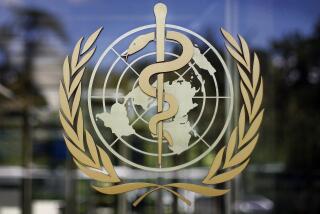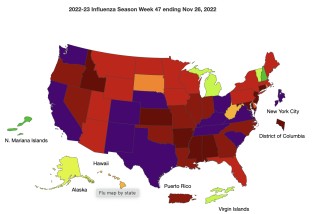Mexican officials lower swine flu alert level
LOS ANGELES AND MEXICO CITY — Amid signs that the H1N1 influenza outbreak in Mexico is waning, health authorities there said Monday that they were lowering the alert level and would begin allowing nonessential businesses to reopen, starting with restaurants Wednesday. Museums, churches and libraries can open a day later.
Mexican President Felipe Calderon said schools would reopen gradually. University and preparatory students will return to class Thursday, but those in lower grades will remain out until Monday to give officials more time to clean facilities.
“Today the situation is stabilizing, and we are on the way toward normalcy,” Calderon said.
Health Secretary Jose Angel Cordova said that no new deaths from H1N1 had occurred since Wednesday and that the number of new patients was falling. He said tests had confirmed the virus in 802 cases, fewer than half of the 2,150 samples checked.
“I am optimistic about these findings,” he told reporters, concluding that the virulence of H1N1 is no worse than that of seasonal flu, which kills tens of thousands of Mexicans each year.
Nightclubs, movie theaters and sports stadiums will remain closed until the alert level is reduced further.
Dr. Richard Besser, acting director of the Centers for Disease Control and Prevention, said, “What we are seeing is an illness that looks very much like seasonal flu. . . . We’re not seeing the type of severe disease that we were worrying about.”
He emphasized, however, that it would be premature to declare the problem under control. “I’m not ready to say that,” he said.
Experts remain concerned because influenza viruses are subject to frequent mutations. Plus, the virus that caused the 1918 Spanish flu pandemic was mild in its initial incarnation in the spring, then turned lethal in the fall.
The number of confirmed cases worldwide has been increasing almost by the minute, with the total now more than 1,200. In the U.S., 27 new confirmed cases in New York -- including 17 outside New York City -- brought the total to 365.
The number of confirmed cases in California has risen to 79, including 11 in Los Angeles County, two in Orange County, two in Ventura County, four in San Bernardino County, six in Riverside County, 11 in Imperial County and 24 in San Diego County.
The California Department of Public Health said there were more than 120 probable cases in the state.
Outside Mexico, virtually all of the confirmed cases have been mild. But Canada said it had recorded its first severe case, a girl in Alberta who is being treated in an intensive care unit in Edmonton. She had not been to Mexico.
The World Health Organization sent mixed signals about the potential escalation to a pandemic. Director-General Dr. Margaret Chan, in an interview with a Spanish newspaper, implied that the agency would raise its infectious disease alert level to Phase 6, the highest possible.
Other officials quickly reversed that message. U.N. Secretary-General Ban Ki-moon, addressing an informal session of the General Assembly, said: “If the situation remains as it is, WHO has no plan to raise the alert level to 6 at the moment.”
At the WHO’s daily news conference, Assistant Director-General Dr. Keiji Fukuda reaffirmed that. “We do not have any evidence that the virus has taken hold and led to community-level transmission in any other countries” other than in North America, he said.
Evidence of such sustained remission in a different region of the world is the principal criterion for raising the alert level.
Fukuda emphasized that raising the level meant only that transmission had been observed and said nothing about the virulence of the virus. “Those are two separate things,” he said.
Mexican officials continued to criticize China for its restrictions on Mexican nationals. Residents of Mexico who arrive in China are being quarantined, said Jorge Guajardo, Mexico’s ambassador to China. Mexican authorities said they would send a plane to China to repatriate any Mexicans who wanted to return home.
Chinese officials also quarantined a group of 29 Canadian students and a professor from the University of Montreal over the weekend, even though none of them displayed symptoms, a university spokeswoman said.
Also Monday, Carnival Cruise Lines said it would extend its ban on stops at Mexican ports for its 16 cruise ships until June 15. Such stops had previously been halted through May 11.
--
ken.ellingwood@latimes.com
Times staff writer Rong-Gong Lin II in Los Angeles contributed to this report.
More to Read
Sign up for Essential California
The most important California stories and recommendations in your inbox every morning.
You may occasionally receive promotional content from the Los Angeles Times.










